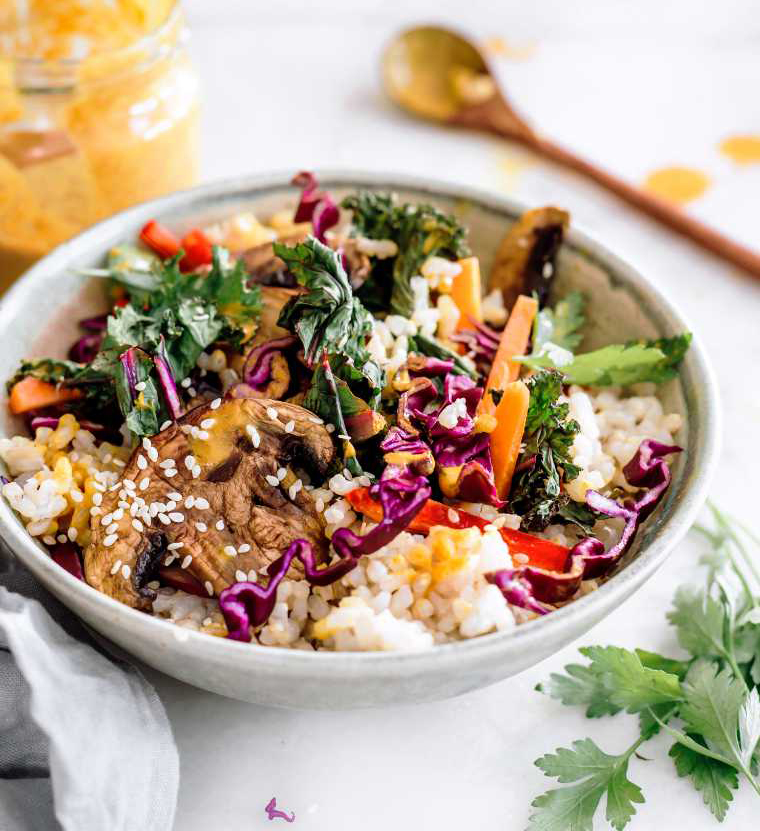Vegan Shopping List and Meal Plan

When you switch to a vegan diet, it can seem daunting, expensive, and a bit overwhelming.
Is dairy not vegan?
What about olive oil?
What the heck can I eat anymore?!
We totally get it. So we decided to simplify it a bit with a shopping list of all the plant-based approved foods, as well as a sample meal plan with some recipes that are absolutely jaw-droppingly delicious, so much so that vegan and non-vegan eaters would love them.
Remember that it doesn’t have to be complicated. In fact, simplicity is the key to success when starting any diet.
Enjoy!
Shopping List:
Let’s start first by going over what you can buy while following a vegan or plant-based meal plan.
Staying on budget can be difficult at times, but so can eating on any other diet. Purchasing frozen versus fresh will always save money, and make sure that you check out the clean fifteen list of foods you can eat non-organic to save some money.
Nuts and seeds can also add up quickly. We recommend choosing one or two of your faves per week in order to keep your options fresh but also your wallet full!
Other ingredients, such as oats, rice, and other grains, are actually pretty affordable in most grocery stores and can supplement nuts or seeds to add more protein to your dishes.
We hope this list helps!
Produce:
- All vegetables: spinach, asparagus, cucumber, carrot, bell pepper, squash cabbage, fennel, tomatoes, etc.
- All fruits: apples, oranges, bananas, strawberries, blueberries, pears, figs, dates, cantaloupe, honeydew melon, etc.
- Can be fresh and frozen
Grains & Pasta:
- Rice
- Farro
- Buckwheat
- Oats
- Sprouted, brown rice, whole wheat pasta
- Brown rice wraps
- Whole grain bread (make sure there is no dairy/milk)
Healthy Fats:
- Avocado
- Coconut oil
- Olive oil
- Nut and seed butter
Proteins:
- Beans: lentils, red beans, black beans, cannellini beans, “butter” beans, navy beans, etc.
- Nuts: almonds, pecans, walnuts, peanuts, Brazil nuts, cashews, macadamia nuts, etc.
- Seeds: chia seed, flax seed, sesame, etc.
- Soy products (with caution): tofu, tempeh, edamame (we recommend staying away from too many fake meat options, as they’re highly processed)
- Powders: pea protein, brown rice protein, hemp protein, etc.
Dairy Alternatives:
- Vegan butter (such as Miyoko’s)
- Vegan yogurts made from nuts or coconut (such as Forager Project, So Delicious!, Ripple Foods, or Kitehill)
- Milk Substitutes: almond milk, coconut milk, oat milk, soy milk, etc.
Egg Alternatives for baking:
- Unsweetened applesauce
- Flax seed mixed with water
- Chia seed mixed with water
- Arrowroot powder
- Corn starch
- Avocado
Condiments:
- Balsamic vinegar
- Apple Cider Vinegar
- Ketchup
- Mustard
- Maple Syrup
- Hot Sauce
- Hoisin Sauce
- Hummus
- Salsa
- Relish
- Soy Sauce
Sample 3-Day Meal Plan:
Day 1:
Of course, we don’t expect you to be making 4 different recipes each day. These are just examples of what a day eating on a vegan meal plan could be. Many of these recipes you can prep ahead of time during your weekly meal prep, and many can be stored in the freezer for whenever you feel like consuming it.
We just wanted to show you the wide variety of options out there! Plant-based eating doesn’t have to be boring. In fact, it can taste just as good, if not better, than the dairy/meat/egg alternative!
Breakfast: Power Green Smoothie
Lunch: Superfood Salad
Dinner: Vegan Meatballs with Marinara
Snack: Slice of Paleo Vegan Banana Bread
Day 2:
Breakfast: Protein Overnight Oats
Lunch: Cauliflower Chickpea Curry with a side salad
Dinner: Spaghetti Squash “Alfredo” Boats
Snack: 5 Minute Protein PB Energy Bites
Day 3:
Breakfast: Vegan “buttermilk” pancakes with dairy-free yogurt and fruit
Lunch: Black Bean Chipotle Chili with Sweet Potato
Dinner: Lentil Bolognese
Snack: Paleo Vegan Sweet Potato Mousse
Supplements:
Now, eating a vegan diet does mean that you’re cutting out a critical source of nutrients. Many people don’t realize that when you take something out, you need to replace it (i.e. you take out a meat source- a big portion of your iron- you need to find ways to supplement that).
Always consult your doctor before taking supplements, but be sure to ask your dietitian and doctor about what B12 supplement might be good for you, as well as iron, zinc, vitamin D, and calcium.
Take Away:
Eating a vegan diet can be as simple or as complex as any other diet! It all depends on you. You can and should choose foods that you enjoy rather than trying to enjoy meals you normally wouldn’t.
We hope this brief meal plan can give you some ideas for how to eat and keep satiated while staying plant-based!
